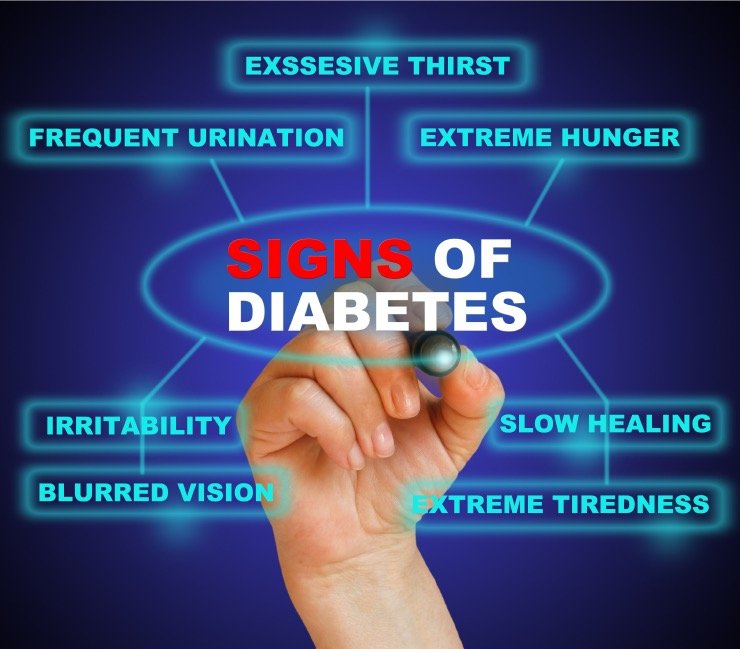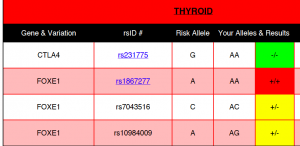What's On This Page?
ToggleToday’s article is about the thyroid and diabetes connection, and I will also cover risk factors, kidney disease and Hashimoto’s, gluten and much more. I have chosen to cover these topics because thyroid illness is a leading cause for diabetes, and I’m afraid that no one has told you this yet.
You know now! If you have my diabetes book, then you knew about it almost 6 years ago.
The Scary Truth
If you don’t uncover the thyroid dysfunction, you could end up with complications of diabetes such as vision loss, heart attack or kidney disease.
This may come as a surprise, but there is actually a very strong correlation between diabetes and hypothyroidism. Both of these disorders share one thing in common: Improper use of their associated hormone. So with diabetes, it is the improper use (or utilization) of insulin, whereas with hypothyroidism, it’s the improper use (or utilization) of thyroxine. These are two totally different hormones, but the net result is the same and the miserable symptoms are the same, and unfortunately, the frequency of misdiagnoses with these two conditions is rather high.
Could you have been misdiagnosed?
What if you have one of these two diseases and you don’t know it yet?
I’m on a Mission
Physicians have a hard time uncovering diabetes and thyroid disease until the damage is done! So many people taking cholesterol-reducing medications now have diabetes, and that’s because statin drugs lead to hyperglycemia, and I’m wondering how many of you started a statin drug and now have diabetes! Happened to my mom, happens to people every single day!
I’ve been on a mission to enlighten you, and empower you. The sad reality is that the wrong biomarkers are tested and when they come up within range, you’re dismissed with a clean bill of health. I wrote about this in my best-selling book in 2010, in fact, I warned you then about the connection between thyroid illness and diabetes. Back then, this correlation was not in vogue and I was a little bullied by some practitioners to produce references to substantiate my thoughts which you can read in my book, Diabetes Without Drugs.
Most of you have a copy of this since you’ve been reading my research articles since 1999. I’ve been helping you for a very long time. Anyway, today, the correlation is really tight. My frustrations have lessened because more and more physicians are picking up hypothyroidism, thus they are treating it and preventing diabetes from ever coming to fruition.
That said, many doctors still only test you in the lab for fasting blood sugar, instead of insulin. BIG mistake! Your FBS will be normal for many years while your insulin is skyhigh! If this was ever tested (along with the FBS), many many more people would find that they had diabetes, or they were in the prediabetes stage.
What would this do?
It would prevent some heart attacks, vision loss, kidney failure and amputations. It makes me sad that many people are not tested correctly until it is too late. So my mission is to help you find out if you have a disorder well in advance. Both hypothyroidism and diabetes are two disorders which have reached epidemic proportions worldwide.
The symptoms are often parallel and include low energy, insomnia, hair loss, nerve pain, more frequent infections, loss of muscle strength, urgency, reduced libido, high blood pressure, arrhythmias, food cravings, increased sensitivity to pain, slow wound healing and poor fingernail growth. There are dozens of other symptoms too! While this may sound bizarre, it’s true.
People with low thyroid hormone and Hashimoto’s are far more likely to have signs and symptoms of diabetes. And visa versa, the incidence of hypothyroidism is increased in both Type 1 and Type 2 diabetes. Consider reading my other article, Hashimoto’s Thyroiditis: Help For The 5 Most Devastating Complications.
Risk factors for developing diabetes:
-
- Taking a statin cholesterol drug
-
- Having hypothyroidism
-
- Experiencing fatigue, cold intolerance, hair loss
-
- Having a TSH above 4
-
- Being female
-
- Being over the age of 40
-
The unfortunate reality is that many of you have already been diagnosed with diabetes and the underlying hypothyroidism has YET to be discovered. This could be due to improper lab testing, so you have fallen through the cracks. My point is that if you have erratic blood sugar levels, elevated blood sugar or have been told you have “prediabetes” or “diabetes” you need to be tested for thyroid disease.
-
If a lack of thyroid hormone is found, you can be given medication or supplements to correct that and then your blood sugar will be more easily managed. This is very important to those of you who eat relatively well, yet still have high blood sugar. I’m saying it could be your thyroid that is driving your instability.
I’d like to reiterate something!
People with diabetes fall through the cracks and all the while you are told you’re fine.
Your undiagnosed condition may be taking a toll on your kidneys. Every diabetes educator and endocrinologist knows that kidney disease sets in many years, up to 10 years before you ever get the diagnosis. So monitoring insulin and blood sugar properly can make the difference between perfect health, and catastrophic complications (think amputation, blindness, and heart disease). So let’s talk about that now.
Signs and Symptoms of Diabetes
The following issues may fly under the radar for many years and they highlight kidney disease (which are clue to diabetes):
1. Protein in the urine (termed albumineria)
2. Hypertension/Ankle swelling (or leg swelling)
3. Leg cramps
4. Frequent trips to the bathroom at night
5. Unexplained itchiness, not due to allergy
6. Nausea or morning sickness feeling
7. Weakness/Fatigue and/or anemia
I bet a lot of you just aligned with some of those symptoms, yet you do not yet have “diabetes.”
Are you overweight? Do you have cravings for sugary foods?
Do you feel better for a while after eating, then crash?
Do you have chronic fatigue and jack yourself up with sugar and salty foods?
7 Signs of Diabetes

These could be signs of impending diabetes. Remember, you could have these symptoms for up to 10 years prior to any noticeable rise in fasting blood sugar… meaning your doctor may have overlooked the opportunity to tell you have insulin resistance, pre-diabetes or full-blown diabetes.
Blood Vessels and Vascular Problems
High blood sugar is like acid on your body’s fragile filtration system. With diabetes, the little blood vessels are harmed and then your kidneys can’t filter garbage out as efficiently. If you are not cleaned out appropriately, the toxins and poisons build up in your bloodstream. You tend to retain water and salt so your ankles may swell. Protein may spill into your urine. You may feel itchy too, especially as waste materials build up in your blood.
Diabetes (and hypothyroidism) will damage your nervous system and affect bladder control. If urine remains in your bladder, and it is laden with a lot of glucose, bacteria will rapidly grow and this will cause UTIs, bladder and kidney infections, and difficulty emptying your bladder.
Incidence
Lab markers would show an elevated BUN and creatinine. Autoimmune Disease Autoimmune disease is often associated with diabetes. If you have Hashimoto’s, Celiac disease, Rheumatoid arthritis, MS or other self-directed attacks to your body there’s a good chance that there is also an attack to your pancreas, with subsequent diabetes.
The incidence of thyroid illness in the diabetic population is substantially higher than the occurrence in the general non-diabetic population. The Journal of Thyroid Research published a scientific paper reviewing prevalence on a worldwide basis. The researchers said, “Thyroid disorders remain the most frequent autoimmune disorders associated with type 1 diabetes. Positive TPO antibodies have been reported in as high as 38% of diabetic individuals.”
TPO Antibodies and Diabetes
TPO stands for “Thyroid Peroxidase” and this is an enzyme you naturally make if you are healthy. If you happen to have antibodies to this enzyme, your thyroid is being attacked and your levels will fluctuate and you may be diagnosed with Hashimoto’s disease, the autoimmune form of hypothyroidism.
The researchers above are basically saying that diabetic people have antibodies to their thyroid gland. They are killing their thyroid gland with a self-directed attack! What causes the attack? It is usually a pathogen, as in “infection” but it could also be a certain food category like gluten, dairy, soy or corn for example.
The problem is a much more complicated than this, but for simplicity, I will tell you it’s often a permeable (leaky) gut barrier that allows partially digested food globules and proteins to go where they should not be going. In other words these food proteins (for example gluten and dairy proteins) go from the inside of your gut to the outside, thus getting into your bloodstream.There is more about diabetes and weight management in my best-selling book, which went to #1 in it’s category on Amazon: Diabetes Without Drugs

Suzy Cohen, has been a licensed pharmacist for over 30 years and believes the best approach to chronic illness is a combination of natural medicine and conventional. She founded her own dietary supplement company specializing in custom-formulas, some of which have patents. With a special focus on functional medicine, thyroid health and drug nutrient depletion, Suzy is the author of several related books including Thyroid Healthy, Drug Muggers, Diabetes Without Drugs, and a nationally syndicated column.


